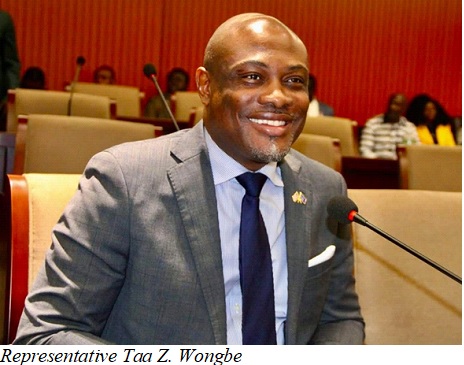MONROVIA – For too long, the echoes of external markets had dictated the rhythm of Liberia’s economy, leaving local communities yearning for a deeper, more resilient foundation. But change is at hand. Nimba County’s Representative Taa Wongbe’s bill, the “Future Wealth Protection and Local Growth Stimulus Bill”—a bold, unprecedented legislative mandate is designed not just to repair, but to fundamentally redefine Liberia’s economic destiny. It’s a bill conceived in the belief that true national wealth begins at the grassroots, with the empowerment of Liberian entrepreneurs, the strategic investment in critical infrastructure, and the vigilant stewardship of the nation’s precious resources, The Analyst’s Anthony Q. Jiffan, Jr. reports.
Nimba County District #9 Representative Taa Z. Wongbe on Tuesday, November 25, 2025, introduced two bills to the House of Representatives aimed at strengthening Liberia’s economy now while safeguarding prosperity for generations to come.
Write a short introductory note for a story of a stimulus bill to boost local growth and protect Liberia’s future wealth
The National Community & MSME Stimulus Bill, 2026 and The Liberia Future Generations Extractive Savings Fund Act, 2025 compose one of the most ambitious twin policy proposals in recent legislative history, pairing immediate grassroots economic support with long-term national wealth preservation.
The first proposal, the National Community & MSME Stimulus Bill, 2026, seeks to inject US$10 million directly into the hands of ordinary Liberians through community groups, women’s organizations, MSMEs, and farmer cooperatives across all 73 districts.
Rep. Wongbe said too many citizens feel “disconnected from the national budget,” arguing that public resources should create measurable impact within communities. Adding that the bill aims to transform the national budget into “a direct tool of empowerment, not bureaucracy.”
According to him, the bill when passed will ensure US$10 million allocation in the FY2026 National Budget, implementation managed by the Liberia Agency for Community Empowerment (LACE), 95% of all funds to be transferred directly to beneficiaries via bank or mobile money
The eligibility criteria for grant will be limited to legally registered MSMEs, women’s groups, community-based organizations, and cooperatives which will entitled to a minimum of US$250 up to US$7,500.
Rep. Wongbe said as rooted in Article 7 of the Liberia Constitution, the bill aims to promote equality, participation, and local economic vibrancy.
Rep. Wongbe emphasized that the stimulus will “deliver visible development in every district, stimulate local economies, and empower the entrepreneurial spirit of our people.”
The second bill, the Liberia Future Generations Extractive Savings Fund Act, 2025, proposes the creation of a national sovereign wealth fund to secure a share of extractive revenues particularly from mining, petroleum, and forestry for long-term national stability and intergenerational equity.
With extractive activities expanding, the Act seeks to impose fiscal discipline and shield the nation’s revenue from political cycles and global commodity shocks.
The core objectives of the bill include converting non-renewable resource income into lasting financial assets, stabilizing the economy during price fluctuations, ensure transparency in revenue management, and provide future financial protection for Liberia.
The bill when passed will mandate a compulsory deposit of 10% of all extractive revenues, and establishment of a protected Permanent Capital Base.
“Grounded in Article 34(d)(ii), the PFM Act, and the LEITI Act—and aligned with the internationally recognized Santiago Principles—the bill charts a modern, transparent path for resource governance”.
The long-term benefits of the bill include, stronger national credit standing, reduced vulnerability to economic downturns, a sustainable financial asset base for future generations, and reinforced public confidence through transparent oversight.
Rep. Wongbe described the Act as “a historic opportunity to secure the blessings of our natural resources for all Liberians not just today, but for decades to come.”
If passed, Rep. Wongbe’s legislative package could significantly reshape Liberia’s approach to community development, public accountability, and long-term economic resilience marking a defining moment in the country’s financial governance trajectory.

Comments are closed.